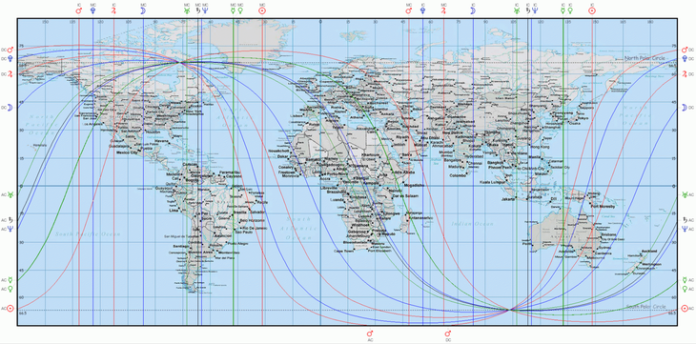“], “filter”: { “nextExceptions”: “img, blockquote, div”, “nextContainsExceptions”: “img, blockquote, a.btn, a.o-button”} }”>
Heading out the door? Read this article on the new Outside+ app available now on iOS devices for members!
>”,”name”:”in-content-cta”,”type”:”link”}}”>Download the app.
If you’ve ever noticed that certain aspects of your personality shine brighter depending on your location, you’ve already started your exploration of astrocartography. And you’re not alone. The term, coined in the 1970s, currently boasts 26.4 million related posts on TikTok, with creators and followers eager to explore the “astrology of place.”
Just as astrology can provide you with insight around your personality and life experiences, astrocartography can help you determine the most aligned locations for you to visit or even live, depending on your goals and desires.
What Is Astrocartography?
According to astrologer Sam Reynolds, the purpose of astrocartography relates less to the place itself and more to you within it. “It’s about determining your experience of a place according to that chart—how you experience different parts of yourself in that place,” he says.
“It’s almost as if you took your first breath at the same exact moment in time but in a new geographical place,” says astrologer Helena Woods, who specializes in astrocartography and locational astrology. “Our unique maps show us the influential, prominent places in the world for us.”
The practice relies on planetary lines that represent the planetary paths at a given time and location. These lines run vertically or diagonally and are projected onto a map of the world using specialized software. An astrocartography map offers a visual representation of your unique relation to place, along with a general take on the planets and their relation to your relocation chart.
Astrocartography relies on a relocation chart—basically, your birth chart but with your birthplace switched for the new location in question—to help you understand how a physical place will influence you according to the stars and planets.
Relocation charts look just like your birth chart but with a new location and time zone (and the accompanying astrological shifts), providing a touch more nuance and personal detail. Sites like Astro.com allow you to access your relocation chart for free, inviting you to enter any city in the world and see how things shift.
Both astrocartography maps and relocation charts are essential to a thorough astrocartography reading.
When to Use Astrocartography
If you’re considering using astrocartography to determine your next (literal) move, know that your decision will still be an incredibly personal one.
“It depends entirely on what you’re looking for in life, the unique placement of your planet in your birth chart, and the timing,” says Woods of using relocation charts to find a new place to live. She tends to rely on her reading for more ephemeral experiences. “I love using astrocartography to time my travels and trips to expand on something in my life.”
Although planning and intention can make all the difference—and truly change your life. “I moved from New York to Santa Fe, which is close to or maximizes my Neptune line,” says Reynolds. “Inspiration, spirituality, these things are more emphasized here, whereas it was a little more muted in New York.”
As with most astrological concepts, astrocartography is more of a helpful tool than any sort of quick, all-encompassing fix. Consider your findings an additional layer of insight rather than the entire picture.
How to Read a Relocation Chart
Analyzing the planetary lines allows astrologers (and, yes, you) to understand whether a particular location on or near a line has a strong influence on you based on your chart and its relation to each of the zodiac signs. “By virtue of that, we can figure out how things are magnified or how they work in your life,” Reynolds explains.
“While the importance of distance from planetary lines seems to vary according to each astrologer, most agree that places within 150 to 200 miles of a planetary line will be strongly affected by that planet’s influence.
More specifically, the planetary lines on your chart are read by looking at where the planets are related to four angles on your chart: your ascendant (rising), descendant (seventh house), midheaven (tenth house at the top of your chart), and IC (imum coeli or fourth house). “You will see your chart stays the same except the areas of life (the houses) shift as well as the new aspects to the four angles,” says Woods of your relocation chart. (Note: While astrocartography maps demonstrate points where planets meet up with those four angles of your chart, relocation charts provide further information by showing what astrological houses the planets have moved to regardless of their relation to your angles.)
Another factor to consider when deciphering your relocation chart are the parans, horizontal latitude crossings that meld planetary energies and can affect your experience of a place. Woods notes that these lines don’t always show up when using the free mapping software available online—meaning it may be best to consult an expert if you’re considering a physical shift.
What Each Planetary Line Means in Astrocartography
Astrocartography is a complicated subject. Understanding the general associations of each planetary line is a helpful place to start.
1. Sun
Sun lines bring increased willpower and self-expression.
2. Moon
Moon lines bring nurturing and emotional connection.
3. Mercury
Mercury lines bring intellect and communication.
4. Venus
Venus lines bring themes related to values and appreciation.
5. Mars
Mars lines bring action and assertion.
6. Jupiter
Jupiter lines bring expansion and growth.
7. Saturn
Saturn lines bring responsibility and discipline.
8. Uranus
Uranus lines bring unpredictability and innovation.
9. Neptune
Neptune lines bring dreaminess and artistic vision.
10. Pluto
Pluto lines bring transformation and intensity.













